沪教牛津英语五年级上册知识点归纳
- 格式:doc
- 大小:38.00 KB
- 文档页数:6

M1U1 Can I do this?1. 用‘there’作为开头表示事实,例如:There’s the red man。
2。
用祈使句发指令。
例如:Cross! Go! Wait!3. 用祈使句的否定形式禁止他人做某事。
例如:Don’t Cross the road。
Don't smoke。
Don’t make a noise.4。
用名词表达事物。
例如:The traffic light’s red.5。
用情态动词can征求允许。
例如:Can I go out , Mum?6. 用Here you are回答问题。
(给你)7. 用现在进行时表达正在进行的事情。
例如:They are going out。
8。
用一般现在时态表达简单的事实。
例如:They are on the train。
9. 学习用which对定语提问。
例如:Which sign means ‘Don’t eat or drink’?(哪一个标志的意思是“禁止吃喝”)10. 用I’m sorry. 表达歉意。
11. 在否定句中用or代替and。
例如:Don’t eat or drink.M1U2 This is what I want1. 用What do you want ? 询问“你想要什么?”2. 用I want…表达要求。
例如:I want some paper.3. 学习用Here’s /Here are …表达“给你… …”。
4。
用Thank you very much.表达感谢。
5。
用形容词修饰东西。
例如:a large Coke (一大罐可乐)6。
用情态动词can征求许可。
例如:Can I have some fish,please?7。
学习关于菜的名称。
例如:noodles、vegetablesM1U3 This is what I need1。
关于学习用品的单词。
例如:books.2。
用’What do you need for school ?' 询问“你上学需要什么?"3。
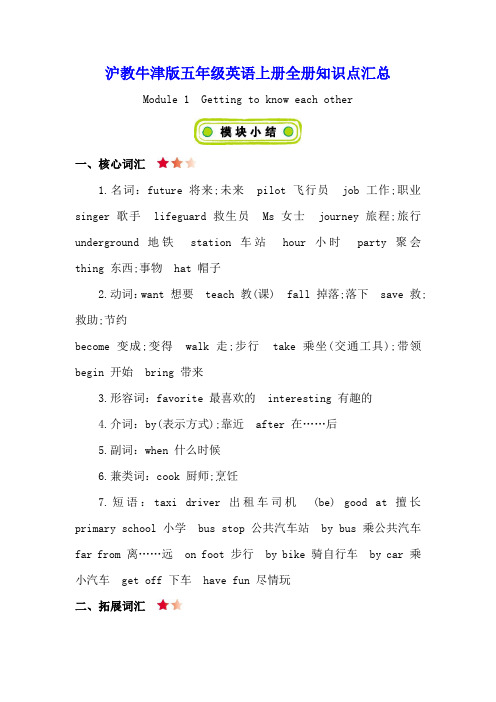
沪教牛津版五年级英语上册全册知识点汇总Module 1 Getting to know each other一、核心词汇1.名词:future 将来;未来pilot 飞行员job 工作;职业singer 歌手lifeguard 救生员Ms 女士journey 旅程;旅行underground 地铁station 车站hour 小时party 聚会thing 东西;事物hat 帽子2.动词:want 想要teach 教(课) fall 掉落;落下save 救;救助;节约become 变成;变得walk 走;步行take 乘坐(交通工具);带领begin 开始bring 带来3.形容词:favorite 最喜欢的interesting 有趣的4.介词:by(表示方式);靠近after 在……后5.副词:when 什么时候6.兼类词:cook 厨师;烹饪7.短语:taxi driver 出租车司机(be) good at 擅长primary school 小学bus stop 公共汽车站by bus 乘公共汽车far from 离……远on foot 步行by bike 骑自行车by car 乘小汽车get off 下车have fun 尽情玩二、拓展词汇1.名词:doctor 医生teacher 老师sky 天空subject 科目2.月份名词:January (Jan.) 一月February(Feb.) 二月March(Mar.) 三月April(Apr.) 四月May 五月June(Jun.) 六月July(Jul.) 七月August(Aug.) 八月September(Sept.) 九月October(Oct.) 十月November(Nov.) 十一月December(Dec.) 十二月3.动词:help 帮助4.短语:fly a plane 驾驶飞机be afraid of 害怕三、核心句型1.—What do you want to be? 你想要成为什么?—I want to be a pilot. 我想要成为一名飞行员。
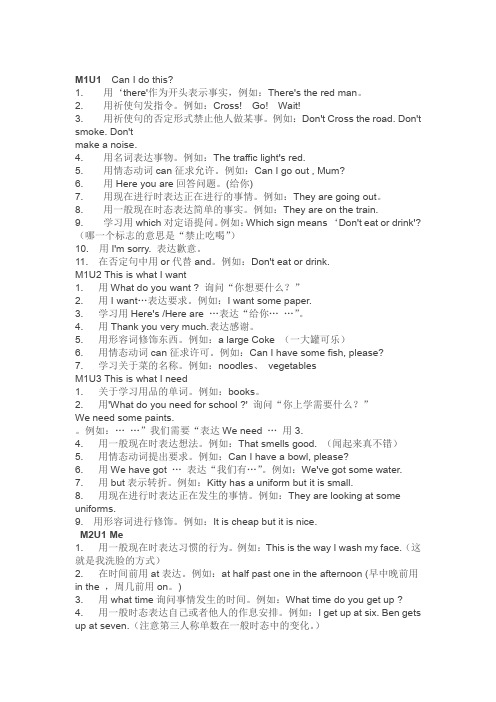
M1U1 Can I do this?1. 用‘there'作为开头表示事实,例如:There's the red man。
2. 用祈使句发指令。
例如:Cross! Go! Wait!3. 用祈使句的否定形式禁止他人做某事。
例如:Don't Cross the road. Don't smoke. Don'tmake a noise.4. 用名词表达事物。
例如:The traffic light's red.5. 用情态动词can征求允许。
例如:Can I go out , Mum?6. 用Here you are回答问题。
(给你)7. 用现在进行时表达正在进行的事情。
例如:They are going out。
8. 用一般现在时态表达简单的事实。
例如:They are on the train.9. 学习用which对定语提问。
例如:Which sign means ‘Don't eat or drink'? (哪一个标志的意思是“禁止吃喝”)10. 用I'm sorry. 表达歉意。
11. 在否定句中用or代替and。
例如:Don't eat or drink.M1U2 This is what I want1. 用What do you want ? 询问“你想要什么?”2. 用I want…表达要求。
例如:I want some paper.3. 学习用Here's /Here are …表达“给你……”。
4. 用Thank you very much.表达感谢。
5. 用形容词修饰东西。
例如:a large Coke (一大罐可乐)6. 用情态动词can征求许可。
例如:Can I have some fish, please?7. 学习关于菜的名称。
例如:noodles、vegetablesM1U3 This is what I need1. 关于学习用品的单词。
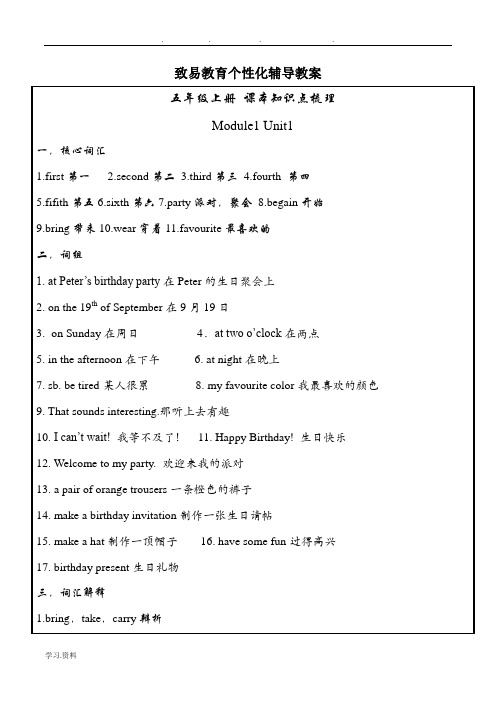
致易教育个性化辅导教案五年级上册课本知识点梳理Module1 Unit1一,核心词汇1.first第一2.second第二3.third第三4.fourth 第四5.fifith第五6.sixth第六7.party派对,聚会8.begain开始9.bring带来10.wear穿着11.favourite最喜欢的二,词组1. at Peter’s birthday party在Peter的生日聚会上2. on the 19th of September在9月19日3.on Sunday在周日4.at two o’clock在两点5. in the afternoon在下午6. at night在晚上7. sb. be tired某人很累8. my favourite color我最喜欢的颜色9. That sounds interesting.那听上去有趣10. I can’t wait!我等不及了!11. Happy Birthday! 生日快乐12. Welcome to my party. 欢迎来我的派对13. a pair of orange trousers一条橙色的裤子14. make a birthday invitation制作一张生日请帖15. make a hat制作一顶帽子16. have some fun过得高兴17. birthday present生日礼物三,词汇解释1.bring,take,carry辨析bring是指把人或物从别处带到说话人所在的地方。
例如:Bring me some water, please.请给我取点水来。
carry及物动词,“搬运,运送”,一般是指搬运较重的物品。
例如:carry a box on one’s shoulder扛着箱子carry a baby on one’s back背着孩子“携带,带”例如:Almost every teacher carries a watch.差不多每位教师都带着一只表。

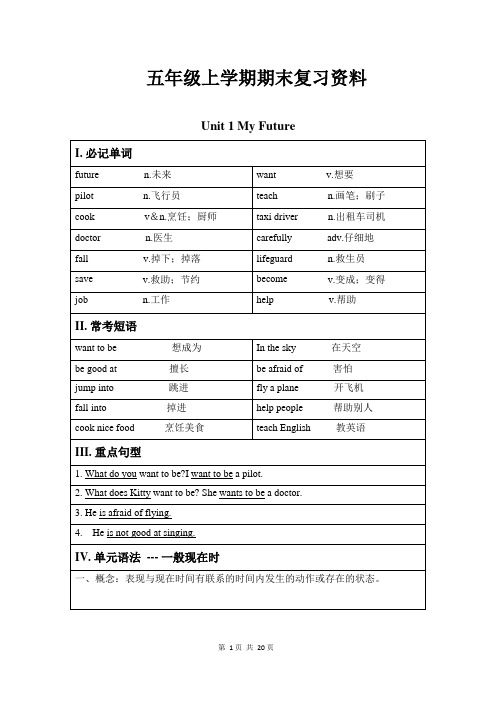
五年级上学期期末复习资料Unit 1 My Future二、标志词:always、usually、sometimes...三、两种表达方式:1.谓语动词(do 动词)末尾加s 或es2.谓语动词保持原形Does he go to the park on Sunday?He goes to the park on Sunday.Do you go to school on Monday?We go to school on Monday. 四、一般现在时态的句型肯定句主语+be+名词(形容词)主语+动词+地点+时间I am a student.我是一个学生。
We go to school on Monday.我们周一去学校。
He goes to the park on Sunday.他周日去公园。
否定句在be 后加not主语+don’t/doesn’t+动词原形+地点+时间I am not a student.我不是一个学生。
We don’t go to school on Sunday.我们周日不去学校。
He doesn’t go to the park on Sunday.他周日不去公园。
一般疑问句be 动词提前到第一位在句首加do 或doesAre you a student?你是一个学生吗?Do you go to school on Sunday?你周日去学校吗?Does he go to the park on Sunday?他周日去公园吗?回答yes /no 回答Yes, I am/Yes, I do. /No, I am not/No they don’t.是的,我是。
不,我不是。
特殊疑问句特殊疑问词+一般疑问句的语序What do you usually do on Monday?你周一常常做什么?What does him usually do on Monday?Unit 2 Going to school一、概念:表示一个正在发生的动作或状态。
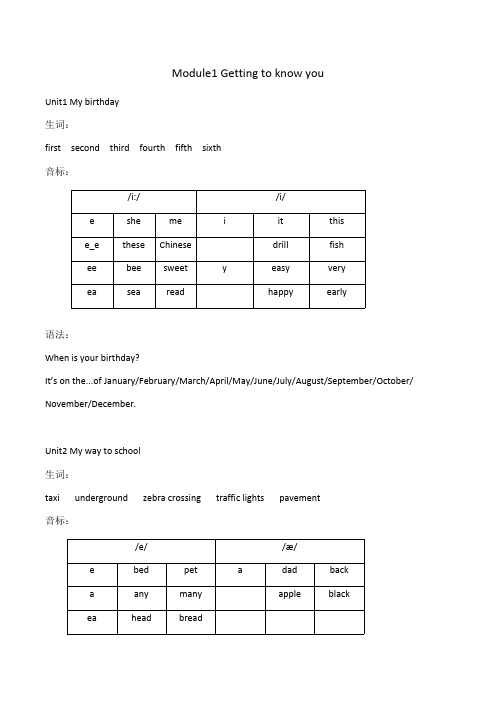
Module1 Getting to know youUnit1 My birthday生词:first second third fourth fifth sixth音标:/i://i/e she me i it thise_e these Chinese drill fishee bee sweet y easy veryea sea read happy early语法:When is your birthday?It’s on the...of January/February/March/April/May/June/July/August/September/October/ November/December.Unit2 My way to school生词:taxi underground zebra crossing traffic lights pavement音标:/e//æ/e bed pet a dad backa any many apple blackea head bread语法:How do you come to school? I come to school...Unit3 My future 生词:worker pilot farmer cook shop assistant音标:语法:What do you want to be?I want to be a/an...Module2 Me,my family and friendsUnit1 Grandparents 生词:write an e-mail go shopping play chess/p/p pick map /b/bbookjob/t/t taste fruit /d/ddatebadk kite work c cook picnic/k/ckclock duck /g/ggamebig音标:语法:How often...Unit2 Friends 生词:Same different both all音标:语法:sb. both...(do)...Unit3 Moving home/a://Λ/aclass past uus club askbath duck puzzle ararm park o other son sharplargelovecolour/u://ʊ/uruleusugar full putpull ootoo school oobook look roomtoothcookfoot生词:West north east south 音标:语法:Why...Because...Module3 Places and activitiesUnit1 Around the city 生词:Hotel bank hospital bakery museum cinema 音标:语法:/f/f food roof /v/v van live /θ/th think tooth /ð/ththatwith/s/s sigh bus ccity nice /z/z zoo size svisitis/ts/tslights parts boats rabbits /dz/dscards clouds handsbedsHow do I get to...,please?Walk along...Unit2 Buying new clothes 生词:button zip pocket 音标:语法:Which ... Do you like, the ... One or the ... One?I like the ... One.Unit3 Seeing the doctor 生词:fever toothache cough cold/ɔ://ɒ/or short horse ooffice box al hall fall off wrong au autumn naughty a what wantoordoorfloorwatch/ɜ://ə/er her term erteacher paper ir bird third driver farmer urnurseturna pandabananaor work word again along 音标:语法:What should I do?You should...Module4 The nature wordUnit1 Water生词:first next then finally音标:/tʃ//ʃ/ch cheap rich sh share fishChina each shirt brush/dʒ//ʒ/g age giraffe s usually pleasureorange cage televisionj job juicejam jump语法:First/Next/Then/Finally,...Unit2 wind 生词:gently stronger slowly quickly 音标:语法:It is blowing gently.Unit3 Fire 生词:Don’t smoke Don’t start campfires Don’t play near fires Don’t play with matches 音标:/tr//dr/trtree try drdress dry train trunk drink draw triangletrafficdrivedream/i:/sheep /i/ship /e/bed /æ/bad /p/pig /b/big /t/hat /d/had /k/back /g/bag /ɑ:/father /ʌ/brother /u:/food /ʊ/foot /f/leaf /v/leave /θ/both/ð/with/s/piece/z/please语法:We must/mustn’t.../ɔ:/water /ɒ/what /ɜ:/purple /ə/paper /t ʃ/rich/d ʒ/giraffe/ʃ/sure/ʒ/pleasure。

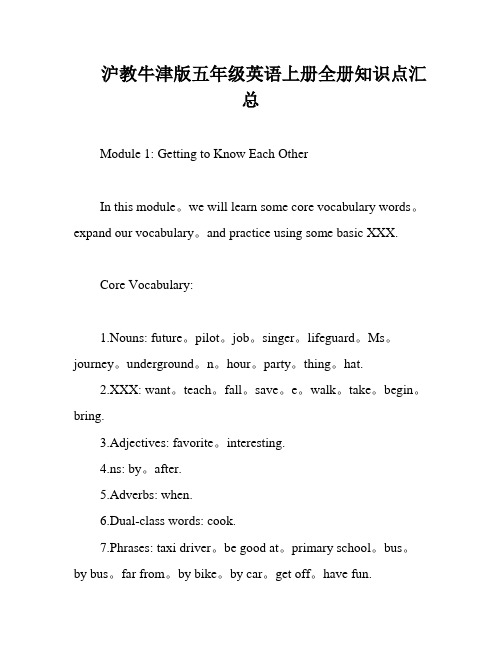
沪教牛津版五年级英语上册全册知识点汇总Module 1: Getting to Know Each OtherIn this module。
we will learn some core vocabulary words。
expand our vocabulary。
and practice using some basic XXX.Core Vocabulary:1.Nouns: future。
pilot。
job。
singer。
lifeguard。
Ms。
journey。
underground。
n。
hour。
party。
thing。
hat.2.XXX: want。
teach。
fall。
save。
e。
walk。
take。
begin。
bring.3.Adjectives: favorite。
interesting.4.ns: by。
after.5.Adverbs: when.6.Dual-class words: cook.7.Phrases: taxi driver。
be good at。
primary school。
bus。
by bus。
far from。
by bike。
by car。
get off。
have fun.XXX Vocabulary:1.Nouns: doctor。
XXX。
sky。
subject.2.Months: January。
February。
March。
April。
May。
June。
July。
August。
September。
October。
XXX。
XXX.3.XXX: help.4.Phrases: fly a plane。
be afraid of.XXX Structures:1."What do you want to be?" - "I want to be a pilot." (Asking XXX.)2."What do you want to be?" - "I want to be a XXX." (Asking XXX.)In this module。
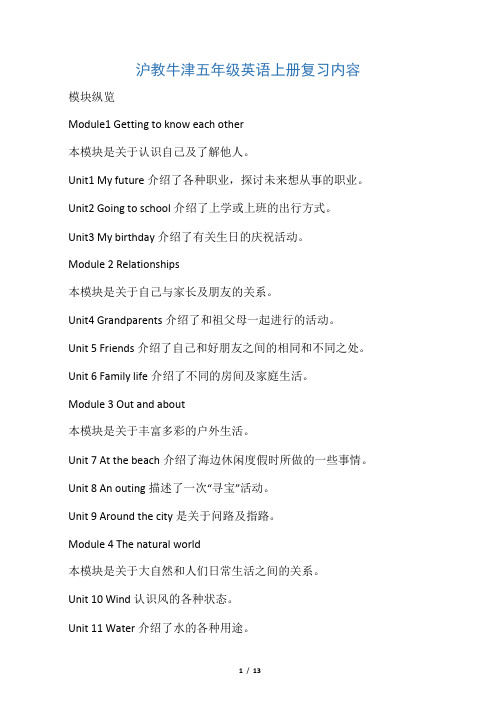
沪教牛津五年级英语上册复习内容模块纵览Module1 Getting to know each other本模块是关于认识自己及了解他人。
Unit1 My future介绍了各种职业,探讨未来想从事的职业。
Unit2 Going to school介绍了上学或上班的出行方式。
Unit3 My birthday介绍了有关生日的庆祝活动。
Module 2 Relationships本模块是关于自己与家长及朋友的关系。
Unit4 Grandparents介绍了和祖父母一起进行的活动。
Unit 5 Friends介绍了自己和好朋友之间的相同和不同之处。
Unit 6 Family life介绍了不同的房间及家庭生活。
Module 3 Out and about本模块是关于丰富多彩的户外生活。
Unit 7 At the beach介绍了海边休闲度假时所做的一些事情。
Unit 8 An outing描述了一次“寻宝”活动。
Unit 9 Around the city是关于问路及指路。
Module 4 The natural world本模块是关于大自然和人们日常生活之间的关系。
Unit 10 Wind认识风的各种状态。
Unit 11 Water介绍了水的各种用途。
Unit 12 Fire介绍了一些基本的防火知识。
第一单元复习1.词组Jump into the lakefly a planecook nice food(be) afraid of flyinghelp peopledrive a taxi(be)good at...2.句型用What do you want to be ?询问对方将来想从事的职业。
用I want to be ...及I want to(do)...介绍自己未来想从事的职业及理由。
3.难点1)当句子主语为第三人称单数时,动词要做适当的变化。
2)want to do与want to be的正确用法。

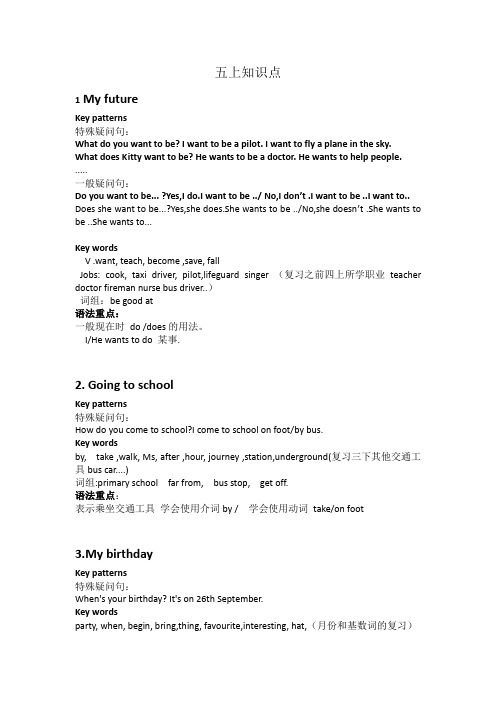
五上知识点1 My futureKey patterns特殊疑问句:What do you want to be? I want to be a pilot. I want to fly a plane in the sky. What does Kitty want to be? He wants to be a doctor. He wants to help people. .....一般疑问句:Do you want to be... ?Yes,I do.I want to be ../ No,I don’t .I want to be ..I want to.. Does she want to be...?Yes,she does.She wants to be ../No,she doesn’t .She wants to be ..She wants to...Key wordsV .want, teach, become ,save, fallJobs: cook, taxi driver, pilot,lifeguard singer (复习之前四上所学职业teacher doctor fireman nurse bus driver..)词组:be good at语法重点:一般现在时do /does的用法。
I/He wants to do 某事.2.Going to schoolKey patterns特殊疑问句:How do you come to school?I come to school on foot/by bus.Key wordsby, take ,walk, Ms, after ,hour, journey ,station,underground(复习三下其他交通工具bus car....)词组:primary school far from, bus stop, get off.语法重点:表示乘坐交通工具学会使用介词by / 学会使用动词take/on foot3.My birthdayKey patterns特殊疑问句:When's your birthday? It's on 26th September.Key wordsparty, when, begin, bring,thing, favourite,interesting, hat,(月份和基数词的复习)词组:have fun语法重点:When 的用法具体日子以及介词on 的用法序数词的变化规律4.GrandparentsKey patterns特殊疑问句:What do you usually with your grandparents?--- I usually play chess with my grandpa.(always/often/sometimes...)一般疑问句:Do you play sport with.your grandparents?Yes,I do.No,I don’t./ No, I never...with...Key wordsAlways, usually , often sometimes, never, visit,词组:play sport,go shopping语法重点:频率副词与一般现在时结合的使用5.FriendsKey patterns1.We both like sport.Kity likes...Alice likes... They both like...We all like helping people2.Who’s your good friend? ....is my good friend....are my good friends.3.Are you in the same class?---Yes, We’re both/ all in Class...---No. We’re in different classes.4.Do you like the same sport?---Yes. We both/all like...---No. I like...and...likes....Key wordsclever, same,class, both, heavy different, word easy, say, ask,answer,cross,carry, Bored,then,soon词组;make a phone call, each other语法重点:一般现在时单三的用法Both 的用法6.Family lifeKey patterns1.I'm doing my homework. He’s cooking dinner.2.Where are you? ----I’m in the living room/ bedroom/bathroom/kitchen.3.I usually watch TV with my parents in the evening,but now we’re looking at the stars.Key words房间名称:living room bedroom, kitchen bathroom.(结合2A my left shoe), Life,their,light,watch,TV,before,bedtime关键词组:play word games, watch TV,cook dinner,wash hands ,do homework,turn off,tell a story,model plane语法重点:现在进行时的用法Sb+be+doing sth一般现在时和现在进行时的对比找提示词7.At the beachKey patternsIs Paul collecting shells?Yes,he isKey wordsbeach, enjoy, collect, sea, letter, put know, year,sunshine,shell,词组on holiday ,have a good time语法重点:现在进行时的一般疑问句的用法Be+Sb+doing sth?Yes+人称代词+be.No+人称代词+ben’t.8.An outingKey patternsWhat are you doing?I'm reading the map.Key wordsMap hill, find another, lake, key,think,outing,diamond,funny,hole,词组:at the top of ,get through语法重点:现在进行时的特殊疑问句的用法What be sb doing sth?9.Around the cityKey patternsWalk along Winter Street .Turn left at Spring StreetKey wordspost office, quite along, turn, left, right, between flower shop hospital, toy shop,straight,road词组:get to语法重点:How引导的特殊疑问句以及指令性语言turn left...10.WindKey patternsThe children are flying their kites happily.Key wordsblow, gently, softly,strongly, happily move, slowly, quickly, sound, paper, quiet,windmill,wind-bell,cut语法重点:副词的用法,副词的变化规律11.WaterKey patternsWe use water to wash our hands.Key wordsuse, clothes, farmer useful, up, shine, over tree, ground,tap,vegetable,drop,mountain, inside词组:grow crops, put out fires语法重点:How引导的特殊疑问句12 FireKey patternsWe must be careful with fire. We mustn't play with matchesKey wordsFire hurt. must careful. smoke. Hate,burn,safety,match,heat词组:be careful with, not at all,burn down语法重点:情态动词must和mustn’t的用法。

牛津版五年级英语上册Module 1 Getting to know each other一、核心词汇1.名词:future 将来;未来pilot 飞行员job 工作;职业singer 歌手lifeguard 救生员Ms 女士journey 旅程;旅行underground 地铁station 车站hour 小时party 聚会thing东西;事物hat 帽子2.动词:want 想要teach 教(课) fall 掉落;落下save 救;救助;节约become 变成;变得walk 走;步行take 乘坐(交通工具);带领begin 开始bring 带来3.形容词:favorite 最喜欢的interesting 有趣的4.介词:by(表示方式);靠近after 在……后5.副词:when 什么时候6.兼类词:cook 厨师;烹饪7.短语:taxi driver 出租车司机(be) good at 擅长primary school 小学bus stop 公共汽车站by bus 乘公共汽车far from 离……远on foot 步行by bike 骑自行车by car 乘小汽车get off 下车have fun 尽情玩二、拓展词汇1.名词:doctor 医生teacher 老师sky 天空subject 科目2.月份名词:January (Jan.) 一月February(Feb.) 二月March(Mar.) 三月April(Apr.) 四月May 五月June(Jun.) 六月July(Jul.) 七月August(Aug.) 八月September(Sept.) 九月October(Oct.) 十月November(Nov.) 十一月December(Dec.) 十二月3.动词:help 帮助4.短语:fly a plane 驾驶飞机be afraid of 害怕三、核心句型1.—What do you want to be? 你想要成为什么?—I want to be a pilot. 我想要成为一名飞行员。
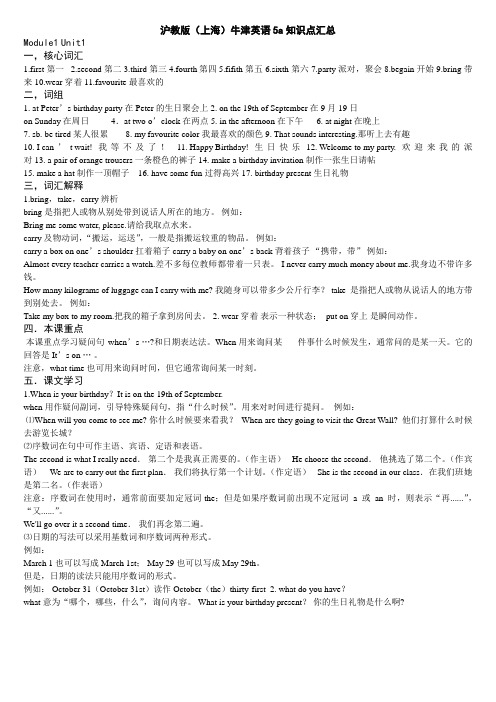
沪教版(上海)牛津英语5a知识点汇总Module1Unit1一,核心词汇1.first第一2.second第二3.third第三4.fourth 第四5.fifith第五6.sixth第六7.party派对,聚会8.begain开始9.bring带来10.wear穿着11.favourite最喜欢的二,词组1. at Peter’s birthday party在Peter的生日聚会上2. on the 19th of September在9月19日on Sunday在周日 4.at two o’clock在两点 5. in the afternoon在下午 6. at night在晚上7. sb. be tired某人很累 8. my favourite color我最喜欢的颜色 9. That sounds interesting.那听上去有趣10. I can’t wait! 我等不及了! 11. Happy Birthday! 生日快乐 12. Welcome to my party. 欢迎来我的派对 13. a pair of orange trousers一条橙色的裤子 14. make a birthday invitation制作一张生日请帖15. make a hat制作一顶帽子 16. have some fun过得高兴 17. birthday present生日礼物三,词汇解释1.bring,take,carry辨析bring是指把人或物从别处带到说话人所在的地方。
例如:Bring me some water, please.请给我取点水来。
carry及物动词,“搬运,运送”,一般是指搬运较重的物品。
例如:carry a box on one’s shoulder扛着箱子 carry a baby on one’s back背着孩子“携带,带”例如:Almost every teacher carries a watch.差不多每位教师都带着一只表。
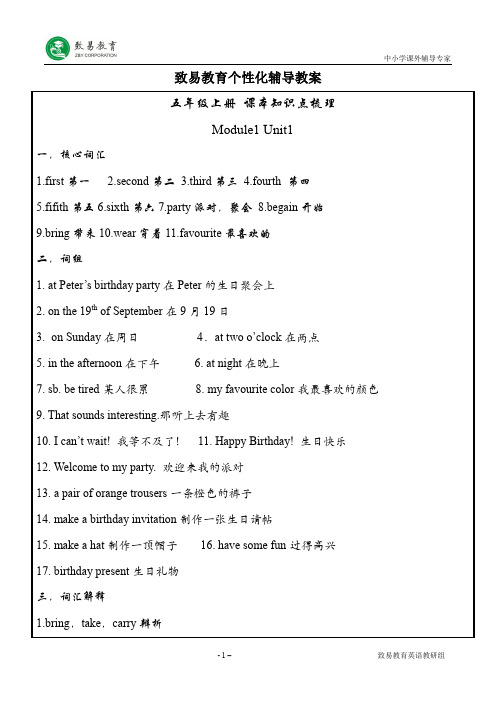
致易教育个性化辅导教案五年级上册课本知识点梳理Module1 Unit1一,核心词汇1.first第一2.second第二3.third第三4.fourth 第四5.fifith第五6.sixth第六7.party派对,聚会8.begain开始9.bring带来10.wear穿着11.favourite最喜欢的二,词组1. at Peter’s birthday party在Peter的生日聚会上2. on the 19th of September在9月19日3.on Sunday在周日4.at two o’clock在两点5. in the afternoon在下午6. at night在晚上7. sb. be tired某人很累8. my favourite color我最喜欢的颜色9. That sounds interesting.那听上去有趣10. I can’t wait!我等不及了!11. Happy Birthday! 生日快乐12. Welcome to my party. 欢迎来我的派对13. a pair of orange trousers一条橙色的裤子14. make a birthday invitation制作一张生日请帖15. make a hat制作一顶帽子16. have some fun过得高兴17. birthday present生日礼物三,词汇解释1.bring,take,carry辨析bring是指把人或物从别处带到说话人所在的地方。
例如:Bring me some water, please.请给我取点水来。
carry及物动词,“搬运,运送”,一般是指搬运较重的物品。
例如:carry a box on one’s shoulder扛着箱子carry a baby on one’s back背着孩子“携带,带”例如:Almost every teacher carries a watch.差不多每位教师都带着一只表。
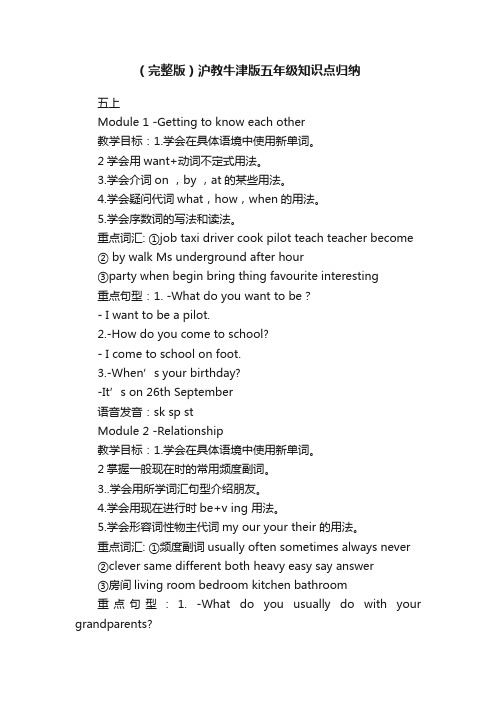
(完整版)沪教牛津版五年级知识点归纳五上Module 1 -Getting to know each other教学目标:1.学会在具体语境中使用新单词。
2学会用want+动词不定式用法。
3.学会介词on ,by ,at的某些用法。
4.学会疑问代词what,how,when的用法。
5.学会序数词的写法和读法。
重点词汇: ①job taxi driver cook pilot teach teacher become② by walk Ms underground after hour③party when begin bring thing favourite interesting重点句型:1. -What do you want to be?- I want to be a pilot.2.-How do you come to school?- I come to school on foot.3.-When’s your birth day?-It’s on 26th September语音发音:sk sp stModule 2 -Relationship教学目标:1.学会在具体语境中使用新单词。
2掌握一般现在时的常用频度副词。
3..学会用所学词汇句型介绍朋友。
4.学会用现在进行时be+v ing 用法。
5.学会形容词性物主代词my our your their 的用法。
重点词汇: ①频度副词usually often sometimes always never②clever same different both heavy easy say answer③房间living room bedroom kitchen bathroom重点句型:1. -What do you usually do with your grandparents?- I usually play chess with my grandparents.2.Kitty likes... Alice likes... we both like...3. -Where are you?- I'm in the bathroom. I’m doing my homework.语音发音:sh dr pr br crModule 3 -Out and about教学目标:1.学会在具体语境中使用新单词。

五年级上册英语知识点汇总:时间的读法:1.直接读法:小时分钟2.整点读法:小时o’clock3.半点读法:half past小时4.半点以内读法:分钟past小时·5.超过半点读法:差几分to下个小时6.含一刻钟读法:a quarter past小时(几点15分)a quarter to下个小时(几点45分)在几点(几分)用介词at相关词汇:基数词o’clock half quarter past to日期的表示:1.月份:January February March April May June July August SeptemberOctober November December对应的缩写:Jan.Feb.Mar.Apr.May.Jun.Jul.Aug.Sep.Oct.Nov.Dec.在几月用介词in,在几月几日,某天(的早中晚)用介词on2.日期:序数词:1~10:first second third fourth fifth sixth seventheighth ninth tenth11~20:eleventh twelfth thirteenth fourteenthfifteenth sixteenth seventeenth eighteenthnineteenth twentieth整十的序数词:变y为ie+th几十几的序数词:几十用基数词-个位用序数词例:21→twenty-first对应的缩写:1st2nd3rd其余的直接数字+th3.几月几日的表示:the日期of月份例:12月28日→the twenty-eighth of December月份日期例:12月28日→December twenty-eighth4.疑问代词When和What time的区别:When What time 询问做某事的时间√√(具体时间)询问年份,月份,日期√√询问现在几点(钟表时间)××乘坐交通工具的两种表达方式:take:take用作动词,表示乘、坐某一交通工具,且在表示该交通工具的名词前一般应有冠词等修饰词。
M1U1 Can I do this?1. 用‘there’作为开头表示事实,例如:There’s the red man。
2. 用祈使句发指令。
例如:Cross! Go! Wait!3. 用祈使句的否定形式禁止他人做某事。
例如:Don’t Cross the road. Don’t smoke. Don’t make a noise.4. 用名词表达事物。
例如:The traffic light’s red.5. 用情态动词can征求允许。
例如:Can I go out , Mum?6. 用Here you are回答问题。
(给你)7. 用现在进行时表达正在进行的事情。
例如:They are going out。
8. 用一般现在时态表达简单的事实。
例如:They are on the train.9. 学习用which对定语提问。
例如:Which sign means ‘Don’t eat or drink’?(哪一个标志的意思是“禁止吃喝”)10. 用I’m sorry. 表达歉意。
11. 在否定句中用or代替and。
例如:Don’t eat or drink.M1U2 This is what I want1. 用What do you want ? 询问“你想要什么?”2. 用I want…表达要求。
例如:I want some paper.3. 学习用Here’s /Here are …表达“给你……”。
4. 用Thank you very much.表达感谢。
5. 用形容词修饰东西。
例如:a large Coke (一大罐可乐)6. 用情态动词can征求许可。
例如:Can I have some fish, please?7. 学习关于菜的名称。
例如:noodles、vegetablesM1U3 This is what I need1. 关于学习用品的单词。
例如:books。
2. 用’What do you need for school ?’询问“你上学需要什么?”3. 用We need …表达“我们需要……”。
例如:We need some paints.4. 用一般现在时表达想法。
例如:That smells good. (闻起来真不错)5. 用情态动词提出要求。
例如:Can I have a bowl, please?6. 用We have got …表达“我们有…”。
例如:We’ve got some water.7. 用but表示转折。
例如:Kitty has a uniform but it is small.8. 用现在进行时表达正在发生的事情。
例如:They are looking at some uniforms.9. 用形容词进行修饰。
例如:It is cheap but it is nice.M2U1 Me1. 用一般现在时表达习惯的行为。
例如:This is the way I wash my face.(这就是我洗脸的方式)2. 在时间前用at表达。
例如:at half past one in the afternoon (早中晚前用in the ,周几前用on。
)3. 用what time询问事情发生的时间。
例如:What time do you get up ?4. 用一般时态表达自己或者他人的作息安排。
例如:I get up at six. Ben gets up at seven.(注意第三人称单数在一般时态中的变化。
)M2U2 What do you like?1. 用Are you …? 询问“你…….?”及其回答Yes, I am.或No, I am not.2. 用祈使句发指令。
例如:Clap your hands.(拍手)3. 用or连接的选择疑问句。
例如:Is Kitty hungry or full?及其回答She is hungry.或She is full。
4. Kitty, it’s your birthday on Saturday.(Kitty, 星期六是你生日)5. 用Which询问“哪个”。
例如:Which bag does Kitty want? (Kitty想要哪个书包?)6. 用I like 或I don’t like …表达喜好。
例如:I don’t like the black one butI like the green one.7. 用Does Kitty like …? 询问“Kitty喜欢…吗?”及其回答Yes, she does.或No, she doesn’t.8. 用but表示转折。
例如:I don’t like the green one but I like the yellow one.9. 指定某一特殊物体。
例如:I want the pink one, please. (我想要粉红色的那个)10. 关于食物的名称。
例如:cabbage, carrots, sausages11. 用What do you like?询问“你喜欢什么?”及其回答I like…“我喜欢……”,例如:I like rice.M2U3 A birthday party1. 日期的表达。
例如:the fourth of February (二月4号)2. 用When’s your birthday?询问“你的生日是哪天?”3. 在日期前用介词on。
例如:My birthday’s on the fourth of February.4. 用序数词表达:twenty-first (第二十一)5. 用Which …do you like? 询问“你喜欢哪个……?”及其回答I like that one.6. 用What are you doing? 询问“你正在干什么?”7. 用现在进行时表达正在发生的事情。
例如:I’m making some cards. (我在制作卡片)8. 用Do you want …or …? 表示选择,意思为“你想要…还是…?”M3U1 My school1. 用There is /are…表达“有…”。
例如:There are two floors.2. 用hundred“百”的表达。
例如:There are a hundred children in my school.3. 用how many 询问数量。
例如:How many floors are there in your school?4. 用时间的表达(具体时间前面用at )。
例如:At a quarter to/past twelve we have our lunch.5. 用一般现在时表示习惯的行为。
例如:I eat my lunch at 7 o’clock in the morning..6. 用I like …表达“我喜欢…”。
例如:I like Monday.7. 用现在进行时表达正在发生的事情。
例如:I am painting a picture.8. 用一般现在时表达事实。
例如:Eight children in our class go to school.9. 用How do you go to …? 询问乘坐什么交通工具?回答:I go by tram.(其中步行用on foot = walk)M3U2 Let’s go shopping1. 用I want 表达“我想要……”.例如:I want a new ball.2. 用指示代词和冠词进行修饰。
例如:I want a new umbrella. That one’s big.3. 用how much询问多少钱。
例如:How much money have you got ?4. 表达钱币。
例如:A ¥50 note is green.5. 用I have got 表达“我有……”。
例如:I’ve got eighty yuan.6. 用Which one?表达“哪一个?”7. 用形容词修饰物品。
例如:The big blue one.8. 用Excuse me.表达“打扰一下”。
9. 用What’s she buying?询问“她正在买什么?”及其回答She’s buying some bread.M3U3 Follow the signs!1. 用祈使句的否定形式表达“禁止……”。
例如:Don’t jump into the pool.2. 用It’s dangerous. 表达危险。
3. 用’Which one means …?’表达“哪个表示……?”4. Eddie and Danny like football.5. 用She has …表达“她有……”。
例如:She has a dog..6. 用现在进行时表达正在发生的事情。
例如:A boy is riding his bicycle here.7. 用can’t 表达“禁止……”。
例如:You can’t ride a bicycle here.8. 用祈使句发指令。
例如:Look at this sign!9. 用Why not?询问理由。
(为什么不?)10. 用适当的介词表示地点。
例如:They are going to North Park by bus.M4U1 Wild animals1. 用一般现在时态表达事实。
例如:Some monkeys live in the jungle.2. 用can表达“能,会”或can’t表达“不能、不会”。
例如:It can swing on the rope.3. 用现在进行时表达正在发生的事情。
例如:This one is eating a banana.4. 用Does it eat…?询问“它吃……吗?”及其回答Yes, it does.或No, it doesn’t.5. 用like 表达喜好。
例如:I like monkeys.6. 用Can a giraffe…? 询问“长颈鹿能……吗?”及其回答Yes, it can. 或No, it can’t.7. 用Where 询问地点。
例如:Where does it live?M4U2 Butterflies1. 用What’s that? How do you spell that in English?询问“那是什么?你用英语怎么拼?”2. 用形容词修饰。
例如:It’s beautiful.3. 用I don’t know .表达“我不知道”。
4. 用一般现在时表达事实。
例如:It lays some eggs on a leaf.5. 用like 表达喜好。